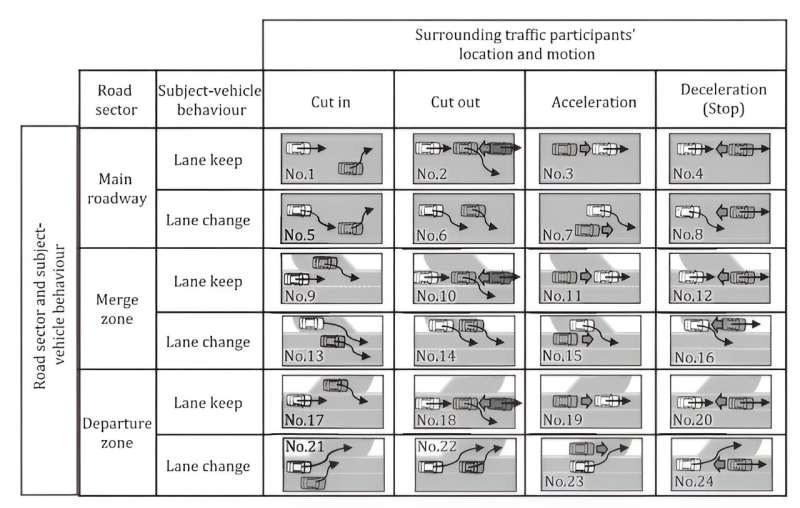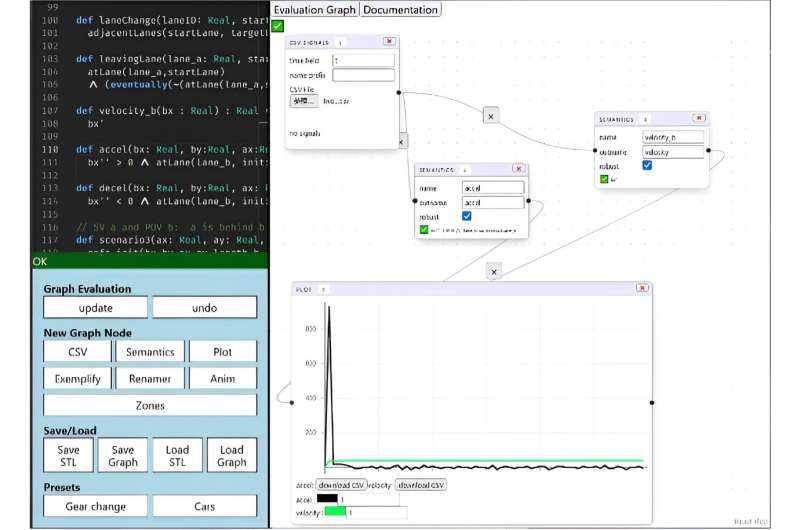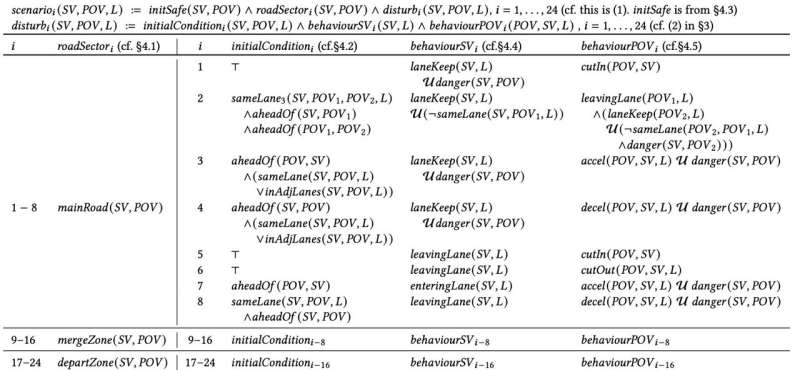#Mathematical formulation of hazardous scenarios for automated driving systems

Table of Contents

A research group including Professor Hasuo Ichiro of the Information Systems Architecture Science Research Division of the National Institute of Informatics, Dr. Waga Masaki, Assistant Professor of the Department of Informatics in the Graduate School of Informatics of Kyoto University and others has mathematically formulated the hazardous scenarios specified in ISO 34502, an international standard that stipulates a framework for the safety assurance of vehicles with automated driving systems as a part of the Exploratory Research for Advanced Technology.
This research translates hazardous scenarios traditionally described in English and other natural languages into descriptions in a formal language called signal temporal logic (STL). This fixes the meanings of hazardous scenarios that may cause differences in interpretation and opens the way to the automation and streamlining of safety evaluation tasks using hazardous scenarios.
This achievement has positive effects on the safety assurance of automated driving vehicles. It also suggests that mathematics plays a significant role in the utilization of requirements likened to contracts between information systems and the human society.
The research findings were presented on April 9, 2024, at the 39th ACM/SIGAPP Symposium on Applied Computing (SAC), an international conference on application of informatics.
Key Points
- For the full ubiquitization of automated driving vehicles, it is imperative that we establish social trust in them based on extensive and detailed safety assurance activities.
- For this purpose, hazardous scenarios faced by automated driving vehicles are comprehensively defined in ISO 34502. Given that they are described in natural language, it is possible that difference may occur in the interpretation of their meanings. It is also difficult to process them mechanically using software tools.
- This research employs a formal language called STL to mathematically formulate the hazardous scenarios in ISO 34502. This fixes the meanings of the hazardous scenarios and opens the way toward the automation and streamlining of monitoring and other safety evaluation tasks.
- It has positive effects on safety assurance of automated driving vehicles. It also suggests the significant role that mathematics may play in the social acceptance of automated driving and other new technologies.
To make the automated driving technologies widely accepted in society, merely improving the safety of automated driving vehicles is insufficient. It is necessary to guarantee their high level of safety and explain this to society to persuade society to accept automated driving vehicles operating on public roads. In Japan and abroad, many different safety assurance frameworks have been proposed. Among them, ISO 34502 is a framework that originated in Japan based on the efforts of Japan Automobile Manufactures Association, Inc.

ISO 34502 provides a comprehensive list of hazardous scenarios faced by automated driving vehicles. They are based on a combination of hazardous elements at each of the three phases, perception, decision and control, that the operations of vehicles equipped with automated driving systems are divided into. This stance takes the approach of guaranteeing the safety of automated driving vehicles by assessing whether or not proper safety actions can be taken in these hazardous scenarios.
However, under ISO 34502, these hazardous scenarios are described in natural language, in English specifically. This poses an obstacle to their large-scale application. The first issue comes from the vagueness of natural language. Take “forcible lane change” for example. There are different interpretations of what exactly it means.
The second issue is the difficulty of software processing. To evaluate safety using the hazardous scenarios it is necessary to execute a huge number of safety evaluation tasks, including monitoring to detect occurrences of hazardous scenarios and creating test data to simulate the operating conditions in which a hazardous scenario may occur. We need software to automate them. However, regarding the hazardous scenarios described using natural language, it is necessary to freshly create software to execute the tasks from scratch for each scenario. This requires a huge amount of labor.
Research method and achievements
To resolve the issues above, the research team mathematically formulated some of the hazardous scenarios described in ISO 34502, particularly those arising from hazardous elements in the decision phase. This process created mathematical definitions for individual hazardous scenarios and fixed their meanings.
The research employed STL to mathematically formulate the scenarios. When writing programs, one uses some programming language which is a formal language. Similarly the hazardous scenarios are expressed in a formal language called STL.
Since the meanings of the vocabulary of STL are already defined mathematically, the meanings of the hazardous scenarios get defined mathematically. In addition, the formulation process was carried out while checking whether or not the mathematical meanings described matched the original intentions of ISO 34502 using STL Debugger, an interactive tool being developed by the research group.
The mathematical formulation in STL solve the second issue above as well. There are a large number of algorithms that can conduct monitoring and generate test data from the data expressed in STL as input, including the previous results of the research group. The current research findings have opened the way toward the application of these algorithms to the evaluation of safety under the ISO 34502 standard.

Outlook
STL is a formal language that is expected to be broadly applied in the manufacturing industry. An ecosystem of STL-based quality assurance software tools is rapidly arising. The current research findings link the software ecosystem and the ISO 34502 framework for the safety assurance of automated driving vehicles. This not only improves the social acceptance of automated driving but also accelerates automation and digitalization in the manufacturing industry.
Meanwhile, it was a common belief that the intended descriptions can only be formalized by engineers familiar with STL. This has hindered the utilization of STL in the industrial world. STL is by no means a difficult formal language. Even so, a learning process is much like that of a new programming language.
Used in the research project, the STL Debugger plays the same role as the debuggers used for general programming languages. It aids the process of learning STL and the use of the language in industry.
The research employs the notion of responsibility-sensitive safety (RSS) distance to define the notion of hazard in the formulation process. RSS is in the spotlight as a method for mathematically proving the safety of automated driving vehicles. It is hoped that the current research achievements will further demonstrate the practical relevance of RSS.
More generally, the mathematical formulation of properties, requirements, specifications, expected usage scenarios etc. of various information systems helps clarify the meanings and automate data processing. It has tremendous industrial and social significance as it aids the development of highly reliable and efficient products.
The research group will work to broadly disseminate this specific form of the application of mathematics in society and to enhance the technologies and software tools that support it. It will thus continue its research efforts with a view toward the establishment of reliable information systems and the social acceptance of these systems.
Professor Ichiro states, “This research was inspired by a collaboration with Mitsubishi Electric Corporation. It proposed ISO 34502 for a case study on the mathematical formulation of requirements in STL which made these achievements possible.
“New information technologies such as automated driving systems and generative AI always face the issue of social trust. In other words, they are tested to see if they are safe enough to be accepted by society. In this process, the requirements that should be met by those information systems act as contracts with society and as the foundation for social trust. Mathematical formulation as in The research project is very important in this respect.
“We will advance our research and development of mathematical technologies to the organize relationships between information technologies and society and to realize a human-centered society where information technologies are used safely.”
Temporal Logic Formalisation of ISO 34502 Critical Scenarios: Modular Construction with the RSS Safety Distance. The 39th ACM/SIGAPP Symposium On Applied Computing (SAC) 2024.
Provided by
Research Organization of Information and Systems
Citation:
Mathematical formulation of hazardous scenarios for automated driving systems (2024, April 29)
retrieved 29 April 2024
from https://techxplore.com/news/2024-04-mathematical-hazardous-scenarios-automated.html
This document is subject to copyright. Apart from any fair dealing for the purpose of private study or research, no
part may be reproduced without the written permission. The content is provided for information purposes only.
If you liked the article, do not forget to share it with your friends. Follow us on Google News too, click on the star and choose us from your favorites.
If you want to read more Like this articles, you can visit our Science category.



